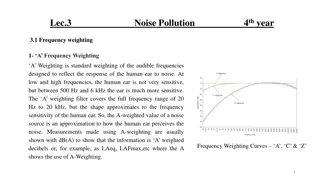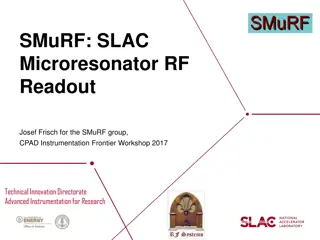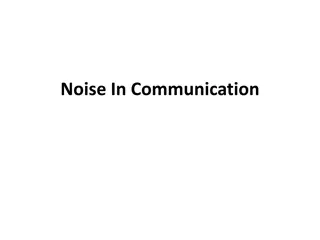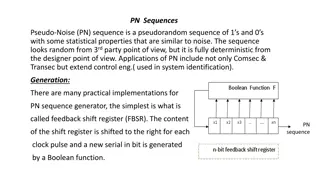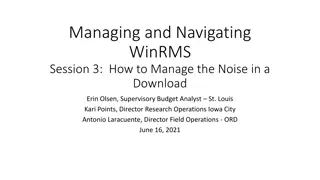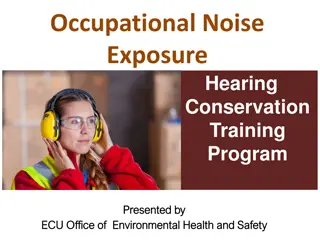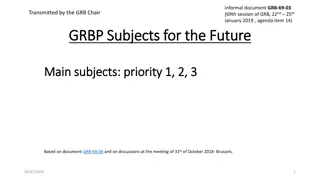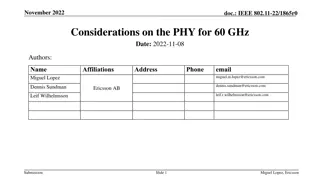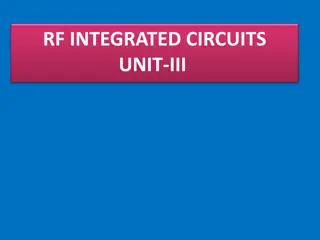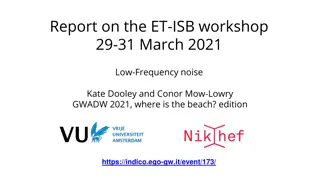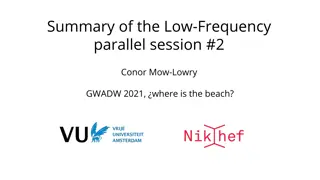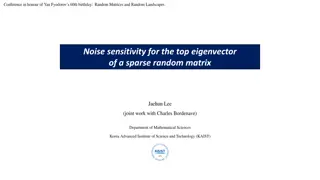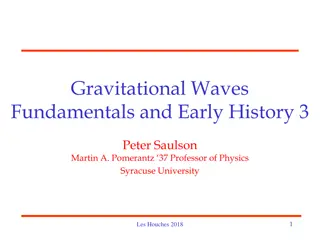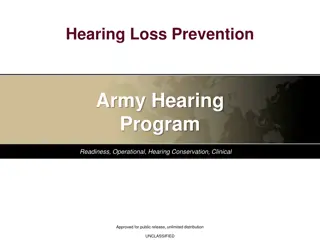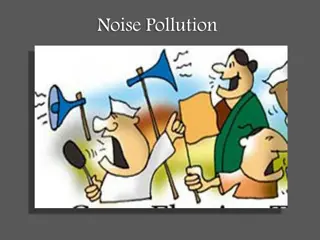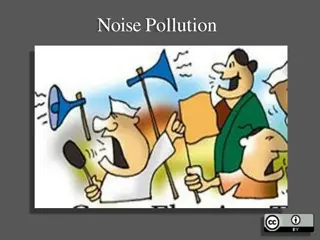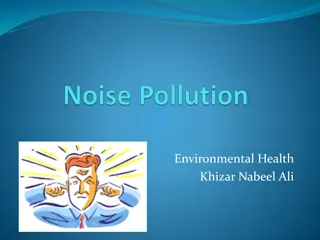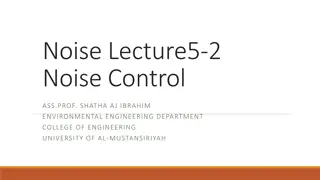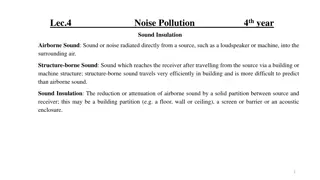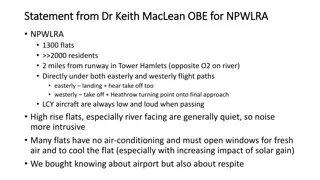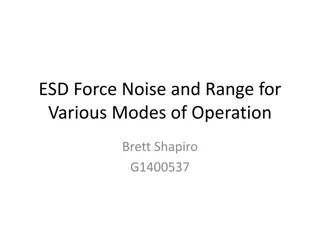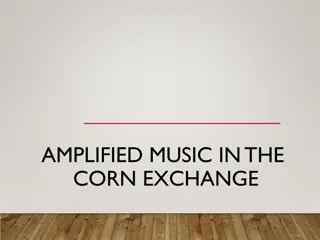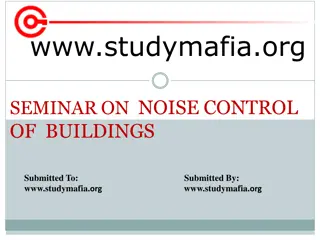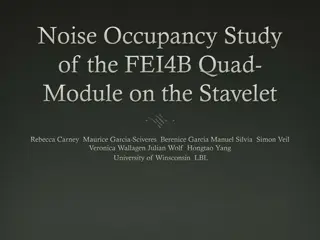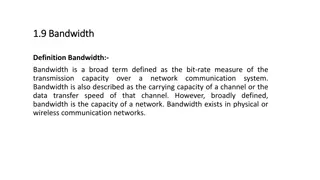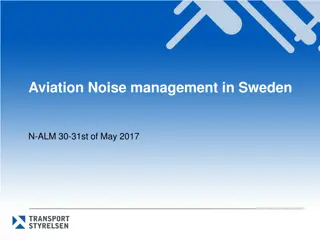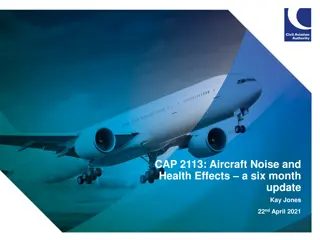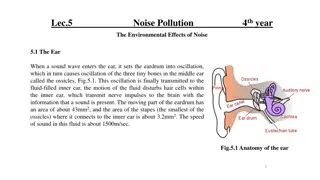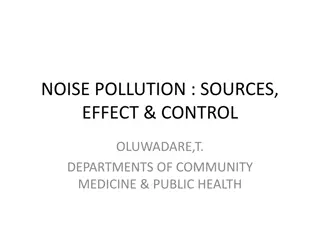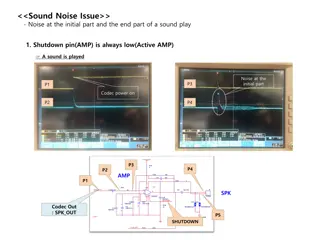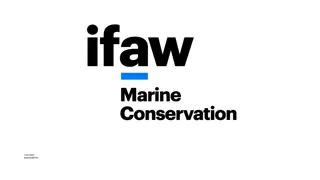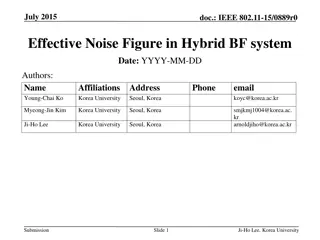Understanding Frequency Weighting in Noise Pollution Measurement
Frequency weighting is essential in noise pollution measurement to reflect how the human ear perceives noise. The A, C, and Z weightings are commonly used to represent different frequency responses. A-weighting covers the audible frequencies where the human ear is most sensitive, while C-weighting i
2 views • 7 slides
SMuRF: SLAC Microresonator RF Readout
SMuRF group at SLAC developed a cutting-edge RF readout system for cryogenic micro-resonators used in research. The system features cold resonators tuned with TES current and a flux ramp to eliminate 1/f noise. Key technical challenges include noise, linearity, wide bandwidth, and computation power.
4 views • 16 slides
Timber Acoustic Wall Panels: A Versatile Solution for Noise Reduction in Open Of
In the ever-evolving landscape of modern office design, creating workspaces that foster productivity, \ncollaboration, and employee well-being is paramount. However, the transition to open office \nenvironments, characterized by expansive layouts and minimal physical barriers, has introduced \nchall
7 views • 2 slides
Understanding Noise in Communication Systems
Noise in communication refers to unwanted energy that interferes with signal reception and transmission. It can be categorized as external or internal noise, each with various subtypes like atmospheric noise and shot noise. Recognizing and managing different types of noise is essential for ensuring
1 views • 8 slides
Understanding Chopper Amplifiers: Applications and Benefits
A chopper amplifier is an electronic circuit methodology used to minimize signals, DC offsets, noise, and low-frequency circuit conditions in operational amplifiers. Chopper stabilized amplifiers employ modulation to reduce noise, while chopper amplifiers find applications in battery chargers, elect
0 views • 7 slides
Understanding Pseudo-Noise Sequences and Applications
Pseudo-Noise (PN) sequences are deterministic yet appear random, with applications in various fields such as communication security, control engineering, and system identification. Generated using shift registers, they exhibit statistical properties akin to noise. Linear and nonlinear feedback shift
1 views • 19 slides
Managing and Navigating WinRMS: How to Manage Noise in Downloads
Explore strategies presented by industry experts on managing noise in WinRMS downloads, including investigations into causes such as VISTA, FMS, PAID, and Fiscal Service. Learn about the impact of noise, types of alerts, and effective resolution techniques for a smoother data management process.
0 views • 40 slides
Acoustics of Entertainment and Sports Venues: Draft IOA Good Practice Guide
This document introduces the Draft Revised IOA Good Practice Guide for acoustics in entertainment and sports venues. It covers the rationale, scope, regulatory framework, risk assessment, noise assessment examples, and the need for revision due to changes in the regulatory landscape since 2003. The
0 views • 31 slides
Occupational Noise Exposure and Hearing Conservation Training Program
Learn about the Occupational Noise Exposure and Hearing Conservation Training Program presented by the Office of Environmental Health and Safety at ECU. This program aims to educate workers about the risks of noise-induced hearing loss, the importance of prevention, and the selection of appropriate
1 views • 20 slides
Future Subjects in Vehicle Regulations: GRBP Priorities and Considerations
The document GRB-69-03 discusses priority topics for future vehicle regulations, including tyre noise limits, track alignment discrepancies, tolerances for defining parameters, anti-tampering measures, pass-by tests, and next-generation testing methods. It also addresses pedestrian horn noise reduct
0 views • 13 slides
Considerations on PHY for 60 GHz in IEEE 802.11-22/1865r0 Document
The document discusses the possibility of standardizing multi-link (ML) with bands in the sub-7 GHz range combined with bands in the 45-72 GHz range, proposing reusing a sub-7 GHz PHY for mmWave bands. It explores the impact of phase noise on choosing the OFDM numerology for operation in the 45-72 G
1 views • 13 slides
Understanding Noise in RF Integrated Circuits: Thermal and 1/f Noise
Noise, an unwanted input, limits a system's ability to process weak signals. Sources of noise include random noise in resistors and transistors, mixer noise, undesired cross-coupling noise, and power supply noise. Thermal noise, caused by thermal agitation of charge carriers, is also known as Johnso
1 views • 49 slides
Insights from ET-ISB Workshop on Low-Frequency Noise and GWADW 2021
The ET Instrument Science Board held a workshop focusing on addressing key challenges related to low-frequency noise in gravitational wave detectors. Experts discussed topics such as mirror temperature, dealing with low-frequency noise realities, and facility limits. The workshop highlighted the sig
0 views • 13 slides
Advanced Understanding of Low-Frequency Noise in Instrumentation
Understanding low-frequency noise in instrumentation has advanced significantly, emphasizing the need for an integrated approach to predict and mitigate such noise. Recent studies show that low-frequency noise in third-generation instruments is exceptionally better than in second-generation detector
0 views • 11 slides
Understanding Noise in Communication Systems
Noise in communication systems refers to unwanted signals that interfere with desired signals, originating from various sources such as interference from human-made sources and naturally occurring random noise. This noise can arise from factors like cross talk, power supplies, ignition systems, and
0 views • 19 slides
Noise Sensitivity in Sparse Random Matrix's Top Eigenvector Analysis
Understanding the noise sensitivity of the top eigenvector in sparse random matrices through resampling procedures, exploring the threshold phenomenon and related works. Results highlight the impact of noise on the eigenvector's stability and reliability in statistical analysis.
0 views • 7 slides
Understanding Gravitational Waves: Basics and Detection Challenges
Exploring gravitational waves fundamentals, early history, and challenges in detection. Covers topics like interpreting noise power spectrum, shot noise in interferometers, radiation pressure, and quantum limits. Illustrates the importance of noise spectrum analysis and mathematical operations in un
0 views • 42 slides
Understanding Receivers and Noise in Radio Astronomy
Discover the challenges faced in radio astronomy due to noise, with the signal often indistinguishable from background noise. Learn about receiver sensitivity issues, minimizing thermal noise, and mitigating atmospheric effects to improve observation quality. Explore the essential elements of telesc
0 views • 55 slides
Understanding Noise Pollution: Causes, Effects, and Control Measures
Undesired or excessive sound, known as noise pollution, can have harmful effects on human health, wildlife, and the environment. It is caused by various sources such as industries, workplaces, highways, railways, and airplanes. Sound waves, measured in decibels, play a crucial role in determining th
3 views • 17 slides
Protect Your Hearing: Strategies for Prevention
Strategies for minimizing noise-related threats in operational environments are crucial to prevent permanent hearing loss. Understanding the risks of loud noise exposure, utilizing hearing protection, undergoing regular audiometric testing, and maintaining noise records are essential components of t
0 views • 22 slides
Understanding Noise Pollution: Sources, Terminology, and Measurement
Noise pollution is defined as undesirable sounds that disrupt human and animal life. This article explores the sources of noise pollution, terminology used in its measurement, and its impact on urban environments. Major sources include traffic noise, industrial machinery, and household activities. U
1 views • 26 slides
Understanding Noise Pollution and Mechanism of Hearing
Noise pollution is defined as unwanted human or machine-created noise that disrupts daily life. This term is explained along with terminology related to frequency and intensity of sound in this informative content. Additionally, the mechanism of hearing is detailed, describing how sound waves are pr
0 views • 34 slides
Understanding the Impact of Noise Pollution on Health and Environment
Noise pollution is a prevalent issue affecting our health and environment. It includes unwanted sound that disrupts daily activities, leading to various health problems like hearing loss, high blood pressure, stress, and more. This pollution stems from both outdoor sources like construction and road
0 views • 27 slides
Understanding Noise Pollution and Its Adverse Health Effects
Noise pollution is the unwanted sound that disrupts daily activities, impacting human well-being. It can lead to health issues like high blood pressure, stress-related illnesses, sleep disturbance, and hearing loss. Despite being invisible, its effects are significant and can cause memory loss, depr
2 views • 21 slides
Understanding Noise Control Methods in Environmental Engineering
Explore the concepts of noise control in environmental engineering, focusing on mufflers, reactive mufflers, and noise control in the transmission path. Learn about absorptive and reactive mufflers, their principles, and applications. Discover how barriers and panels can effectively reduce noise tra
0 views • 9 slides
Sound Insulation Techniques in Noise Pollution Control
Sound insulation is crucial in reducing airborne and structure-borne noise transmission. Techniques such as using partitions, composite partitions, mass, and absorbents help in attenuating sound energy and improving acoustic comfort in buildings. Understanding transmission coefficients, sound absorp
0 views • 7 slides
Concerns Regarding Airplane Noise Impact on Residents in Tower Hamlets
Dr. Keith MacLean OBE provides a statement on the impact of airplane noise on over 2000 residents living in 1300 flats within a 2-mile radius of a London airport in Tower Hamlets. The residents face challenges with noise disturbance from easterly and westerly flight paths, with proximity to both lan
0 views • 10 slides
Innovative Snowmobile Development at University at Buffalo
Delve into the cutting-edge research and development of snowmobile technology at University at Buffalo. Explore the evolution of snowmobile designs, engine configurations, and noise reduction strategies to create a high-performance, marketable, and environmentally friendly snowmobile. From engine ma
0 views • 14 slides
Understanding ESD Force, Noise, and Range in Various Modes
This content discusses ESD force, noise, and range in different modes of operation, presenting assumptions, possible operation modes, and details on maximum range mode and noise characteristics. It explores concepts like control voltage offset, force noise calculations, and practical applications fo
0 views • 9 slides
Noise Control Measures and Community Preferences at the Corn Exchange
Various images and references discuss the history of amplified music events at the Corn Exchange, noise complaints leading to control methods by the FTC, impacts on events and community preferences post-control, and survey findings on participant demographics, noise effects, and desired public event
0 views • 19 slides
Noise Control Strategies for Buildings: A Comprehensive Seminar Overview
Explore the impact of noise on health, methods to control noise in buildings, and various techniques including room acoustics, wall and floor construction, space planning, HVAC soundproofing, and more. Understand the importance of noise reduction for overall well-being and effective sound management
0 views • 20 slides
Noise Occupancy Study of FEI4B Quad Module: Troubleshooting and Solution
This study delves into the noise occupancy of the FE-I4B chips on the quad module mounted on the Stavelet, addressing unexpected noise increases, problem tracing, and cross-checking between USBpix and RCE. Early studies pinpoint temperature control and suspected unstable grounding. The comparison be
0 views • 21 slides
Understanding Bandwidth, Channel Capacity, and Noise in Communication Networks
Bandwidth is a crucial aspect of network capacity, describing the data transfer speed and carrying capacity of a channel. Channel capacity involves factors like data rate, bandwidth, noise, and error rate. Noise sources include thermal noise, impulse noise, and delay distortion, impacting signal qua
0 views • 5 slides
Aviation Noise Management Strategies in Sweden
Aviation noise management in Sweden focuses on a balanced approach with four principal elements: noise reduction at the source, adherence to ICAO noise standards, differentiated landing fees, and operating restrictions. Competent authorities such as the Swedish Environmental Protection Agency and Sw
1 views • 4 slides
Understanding the Impact of Aircraft Noise on Health - Recent Update
This report provides a six-month update on recent research findings regarding aircraft noise and its effects on health. Saucy et al. studied the association between aircraft noise exposure and cardiovascular mortality, particularly at night, with significant findings related to increased odds of nig
0 views • 20 slides
Environmental Effects of Noise Pollution on Human Health
When a sound wave enters the ear, it sets off a chain reaction that can lead to various health issues such as depression, fatigue, insomnia, and decreased cognitive function. Noise pollution affects individuals at different levels - auditory, biological, and behavioral, impacting performance, physio
0 views • 15 slides
Understanding Noise Pollution: Sources, Effects, and Control
Noise pollution is a significant environmental issue resulting from unwanted sounds in various settings. This article delves into the properties of sound, measurement techniques, sources of noise, effects of noise exposure, and strategies for control and mitigation, shedding light on the impact of n
0 views • 16 slides
Troubleshooting Sound Noise Issues in Audio Circuit
Troubleshoot sound noise issues in an audio circuit caused by noise at the initial and end parts of a sound play. Explore solutions involving controlling shutdown pins, codec power management, and external amplifier operations to clear the disturbances effectively. Detailed operation sequences and r
0 views • 6 slides
Addressing Underwater Noise Pollution in EU Waters: Urgent Action Needed
Whales, dolphins, and other marine life are severely impacted by underwater noise pollution caused primarily by shipping activities in EU waters. Urgent implementation of stricter regulations based on IMO guidelines is essential to reduce noise levels and protect marine ecosystems. Recommendations i
0 views • 4 slides
Noise Figure Analysis in Hybrid Beamforming Systems
This document discusses the theoretical study of noise figure (NF) and gain in hybrid beamforming systems, focusing on the impact of additional RF blocks, such as phase shifters and combiners, on noise figure calculations. It explains how the received signals from multiple antennas are phase-correct
0 views • 11 slides
